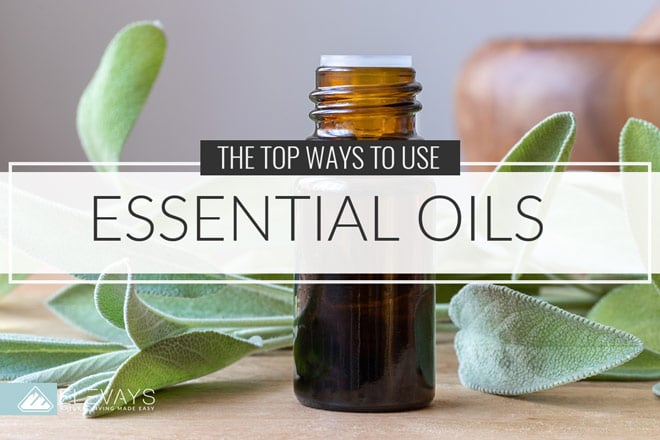Essential oils are a powerful, natural treatment option. They’re highly versatile and can go anywhere with you. The best part about essential oils, besides that they work for many ailments, is that you can use them in multiple ways. However, the best way to use essential oils may depend on your needs.
In this article, we’ll talk about the three main ways you can use essential oils. Then, I’ll show you my favorite options for common ailments many people face daily.
How to Use Essential Oils: 3 Main Ways
The method of application for you may depend on two vital factors: the essential oil and your reason for use.
1. Aromatherapy
Beginners tend to stick with aromatherapy at first, as it’s the easiest way to use essential oils. Aromatherapy provides immediate aromatic benefits, and you don’t have to worry about diluting the oils. All you do is breathe.
The easiest way to gain aromatherapy benefits from essential oils is to add a drop or two to your palm and rub them together before deeply inhaling. You can even breathe the oil from the bottle.
How to Use Essential Oils to Scent a Room:
Investing in a diffuser is the best way to scent an entire room and gain aromatherapy benefits from the oil for hours on end. They come in all shapes and sizes, perfect for all your needs. DIY room sprays can also be helpful.
How to Use Essential Oils in the Shower:
You can also gain aromatherapy benefits by adding five drops of essential oils to a washcloth and taking it in the shower. Either hold the cloth near your face or lay it at your feet for a hands-free boost.
2. Topical Application
Another everyday use for oils, a topical application involves rubbing the oils into your skin. You may need to combine the essential oils with a carrier oil or lotion for this purpose, although some oils are safe for direct application.
Use a topical application method to aid the skin’s appearance, create a natural perfume, boost your immune system, or regulate your hormones. For specific ailments, you may also apply the essential oil directly to your lymph nodes, wrist, temples, head, ears, or other pressure points.
How to Use Essential Oils on Skin: If you’re using essential oils for skin issues, like acne, dullness, or eczema, your best bet is to combine the oil with an unscented face moisturizer. Some, like tea tree oil, can reduce blemishes with direct application. Essential oils are also excellent as massage oils, and they can be used for aromatherapy benefits when topically applied too.
Choose Your Carrier Oil
A carrier oil literally carries the essential oil, bonding and transferring the oils to your body. The right carrier oil depends on the situation:
- Fractionated coconut oil for therapeutic benefits – Odorless and adored by the essential oil industry, this type of coconut oil contains a small molecular structure that’s superior to most carrier oils.
- Avocado oil or extra virgin olive oil for internal use – These oils come from natural and healthier foods that are safe to ingest.
- Virgin coconut oil for cooking – Easy to work with, coconut oil is solid when it’s at room temperature.
- Almond oil for skincare – Rich in skin-nourishing ingredients like vitamin E.
- Jojoba oil for facial care – This oil won’t clog your pores.
- Extra virgin olive oil for dry or cracked skin – Aids deep dehydration through the skin.
Dilute for Age
For a quick guide on how to dilute carrier oils for topical use, follow this basic key:
- Newborns – Proceed with caution for the first three months. Use only for immediate needs, and heavily dilute the oil.
- Infants (under 2-years-old) – A single drop of oil with two teaspoons carrier oil.
- Children (age 3-12) – 2-4 drops of oil with two teaspoons carrier oil.
- Adults – 1-4 drops of oil with one teaspoon of carrier oil.
Avoid using oils like wintergreen, peppermint, oregano, and clove with young children. They can be sensitizing to their skin and should be swapped out for a safer alternative. Citrus oils also shouldn’t be applied to anyone (of any age) topically if you plan to spend time in the sun.
3. Ingestion
Like medications, you can also ingest essential oils. Essential oils have been commonly used for a variety of injuries and diseases since ancient times. However, there’s also a lot of controversy concerning this method.
Internal use is the method to be most careful using. Ingesting essential oils can come with side effects, and you need to understand the risks for each mode of treatment before fully committing.
That said, many people prefer to ingest essential oils as an alternative to medications. Instead of grabbing a bottle of cold medicine, safely using an essential oil can work better than over the counter meds. Tylenol, for example, can cause liver damage. Essential oils won’t. It’s 100% non-toxic, and you never need a prescription.
How to Safely Ingest Essential Oils
Make sure the label reads safe for internal use. Never purchase cheap oils for ingestion, as these aren’t therapeutic grade and won’t produce results. Only ingest options from a reputable source (more on my favorite brands later).
Essential Oils for Ailments: How to Use Essential Oils as a Cure
The number of ailments you can use essential oils to help is astounding. While it’s impossible to list them all, these are the main ailments people use essential oils to daily cure or aid.
Explore the following and determine the best mode of application based on your needs. Keep in mind that you can also use essential oils for a simple boost of energy, serious chronic illnesses, or other conditions as well.
Oils for Sore Throat
Unlike over the counter medications, using essential oils to fight your sore throat helps address the main issue causing your pain, like the flu or common cold. Whatever the reasons for your sore throat, the following oils can be helpful:
- Oregano – One of the strongest antibacterial essential oils, oregano kills bacteria known to cause sinus infections, flu, colds, or strep throat. Dilute the oil and rub it directly onto the lymph nodes in your neck.
- Peppermint – For a pain reliever with anti-inflammatory benefits for the sinuses and respiratory system, peppermint can also help infections heal quicker.
- Lemon – Packed with Vitamin C, anti-inflammatory, antioxidant, and bacteria-killing qualities, this option is best when diluted in four ounces of water.
- Eucalyptus – A powerful way to clear mucus, aid coughs and hoarseness, relieve pain, and kill bacteria, eucalyptus is an antibacterial and stops sore throats in as little as 20 minutes.
- Tea Tree – Kills bacteria and makes a great homemade vapor rub, but should never be ingested for safety.
- Thyme – Thyme kills bacteria that are resistant to antibiotics and helps infections heal faster, making it ideal for sore throat, bronchitis, or strep.
- Clove – Excellent for killing bacteria, clove also prevents and treats the main cause of a sore throat.
- Ginger – An anti-inflammatory essential oil, ginger can stop sore throat, relieve pain, and kill bacteria that cause the cold.
- Cinnamon – Kills compounds that cause strep throat.
- Lemongrass – Best for strep throat, Lemongrass is a powerful way to kill oral thrush bacteria
How to Use Essential Oils for Sore Throat: Try making a tea with essential oil for sore throat. Dilute a drop of cinnamon and a drop of lemon in a half teaspoon of honey. Add the mixture to hot water and stir. Sip to comfort a sore throat. You can also dilute Oregano essential oil in a carrier oil. Try 1 to 2 drops of Oregano in 1/2 a tsp of fractionated coconut oil (regular coconut oil will work too). Massage onto the outside of the throat and into the lymph nodes to help ease a sore throat. I LOVE this strategy. It works so well!
Oils for Cough
Coughs are common, but there is little doctors can do to help. Conventional medications are tempting when you want the scratchy irritation to stop. Yet, cough syrup doesn’t work (1). When using essential oils for cough, make sure to heavily dilute the oil – especially for use on kids. The best oils for cough include:
- Eucalyptus
- Peppermint
- Rosemary
- Clove
- Oregano
- Tea tree
- Lemon
How to Use Essential Oils for Cough: A powerful cough-killing recipe backed by research includes using a room spray with rosemary, oregano, peppermint, and eucalyptus 3 times per day (2). For children, make a powerful DIY vapor rub by mixing five drops of eucalyptus, five drops of peppermint, and two tablespoons of coconut oil.
Essential Oils for Weight Loss
You can ingest, diffuse, or topically apply essential oils to promote weight loss, reduce cravings, boost energy, and help burn fat. The five best essential oils for weight loss include:
- Peppermint – Boosts energy and helps you feel full faster.
- Lemon – Research shows lemon oil can break down body fat (3).
- Grapefruit – Grapefruit activates enzymes to break down body fat, support the metabolism, and cleanse the lymphatic glands (4).
- Ginger – Supports digestion and the healthy absorption of nutrients the body needs.
- Cinnamon – Balances blood sugar, boosts energy, and reduces sugar cravings.
How to Use Essential Oils for Weight Loss: Grapefruit, lemon, and cinnamon oils are my go-to for weight loss. I love adding a drop to my hot tea, especially when sugar cravings kick in.
Oils for Anxiety
Anxiety and stress happen to everyone. It’s the most common mental health illness in the U.S. (4). Keeping an essential oil on hand can help you reduce your anxiety while you’re on-the-go or simply help you rebalance when it’s hard to focus. The best essential oils for anxiety include:
- Lavender
- Lemongrass
- Orange
- Vetiver
- Chamomile
- Ylang-ylang
- Bergamot
- Roman Chamomile
- Frankincense
- Rose
- Clary Sage
- Patchouli
How to Use Essential Oils for Anxiety: When you need to chill, take a deep breath of lavender or diffuse a combination of 4 drops lavender with 3 drops of vetiver essential oils. Any of the above oils also are excellent in a bath before bedtime.
Oils for Sleep
Sleep is vital for your overall well-being, but many people receive much less sleep each night than they should. When you’re having trouble falling asleep or staying asleep, oils can help naturally. Most people see immediate results with:
- Lavender – Well-known for promoting calm and stress relief, a lavender oil is the best sleep aid. It can be applied to the skin or inhaled.
- Vetiver – Often used in massage therapy, vetiver has calming and grounding effects for your emotions.
- Cedarwood – Soothing to the mind and body, cedarwood promotes relaxation when diffused or applied topically.
- Marjoram – Marjoram calms and stops restless minds. Many people find it the most potent essential oil to inhale for sleep.
- Roman Chamomile – An excellent and natural sedative, steep roman chamomile in tea for stress and anxiety relief in the evening.
- Valerian – Used for centuries to alleviate insomnia and improve sleep quality, valerian is an excellent alternative for lavender.
- Ylang-ylang – Another oil with sedative qualities, ylang-ylang also alleviates stress.
How to Use Essential Oils for Sleep:
For a better night’s sleep, I head straight for lavender essential oil. You can add a few drops to a diffuser in your bedroom for all-night relief, create a linen spray to mist your pillow, dap a few drops on your wrist, or inhale a deep breath just before bed. If you take baths in the evening, add 9 drops of lavender and 6 drops of vetiver in a bubble bath, mix and add to bath.
Buy Quality Essential Oils for the Best Results
Make sure also to purchase high-quality oils if you want them to work. Because the industry is currently unregulated, only a trusted source will sell you an essential oil without harmful chemicals. Other brands may use cheap distillation methods or synthetic carrier oils to cut costs, so never skip out on quality for a better deal.
There are several reputable sources where you can buy the highest quality essential oils for you.
Sources:
- MacMillan, Amanda. CNN Health. (2017) Chemists have bad news about your cough syrup. Retrieved from: https://www.cnn.com/2017/01/11/health/does-cough-syrup-work-partner/index.html
- Ben-Arye, E., Dudai, N., Eini, A., Torem, M., Schiff, E., & Rakover, Y. (2011). Treatment of upper respiratory tract infections in primary care: a randomized study using aromatic herbs. Retrieved from: https://www.ncbi.nlm.nih.gov/pubmed/21052500
- Babar, Ali., et al. (2015). Essential oils used in aromatherapy: A systemic review. Retrieved from: https://www.sciencedirect.com/science/article/pii/S2221169115001033
- National Alliance on Mental Illness. Anxiety Disorders. Retrieved from: https://www.nami.org/learn-more/mental-health-conditions/anxiety-disorders









I love essential oils! thanks so much for sharing!
Thank you so much for your comment, Charlene! Glad you’re enjoying the content.